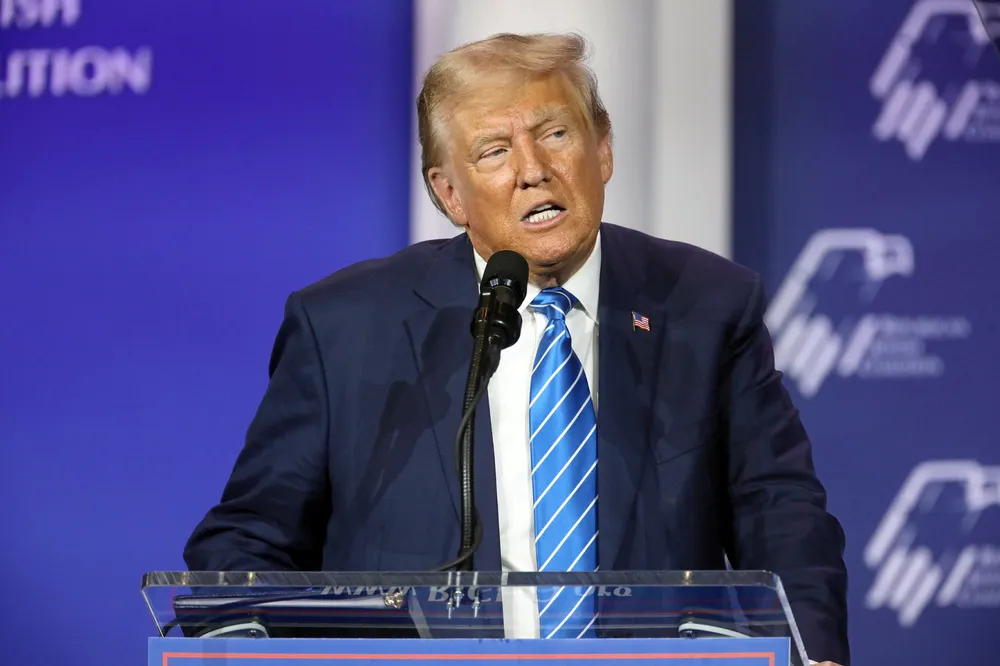Potential Trump executive action to upend US climate law provisions relatively limited: paper
Study by Sabin Center at Colombia’s Law School suggests funds spent would be hard to claw back while detailed tax credit provisions leave less discretion for meddling

If elected president in November, Donald Trump will have the ability to undermine 2022 US climate law provisions through unilateral executive branch action but opportunities to claw back funds and interfere with clean energy tax credits are relatively limited, according to a new study by Sabin Center at Colombia’s Law School.
The 23-page paper reviews the status of implementation of climate programmes in the Inflation Reduction Act (IRA) and evaluates their vulnerability to executive memoranda and orders, while identifying legal constraints on a future administration’s ability to interfere with them.
It addresses the bulk of IRA, the largest federal investment in climate change mitigation and adaptation in American history, which is spending and tax credit provisions.
The law appropriates about $142.3bn to carry out activities designed to reduce greenhouse gas emissions and protect against climate change impacts. This amount includes roughly $105bn for awards, grants, and other direct spending by federal agencies and up to $37bn for federal loans and loan guarantees.
“A future administration would have limited opportunities to claw back funds already spent under the IRA,” said the paper, authored by three Colombia faculty members at the Sabin Center. This would require termination of individual award agreements, which can only occur in limited circumstances.
The paper notes: “Termination of awards based solely on a change in administration priorities could be challenged in court and those challenges would have a high probability of success.”
Trump could seek to re-direct or withhold unspent funds, but there are some important limits on what it could do and no more than 10% of funding allocated to any IRA programme could be transferred to another use.
The paper acknowledges that could still be a “significant amount” for some programmes. Withholding of IRA funds would require approval by Congress under the Impoundment Control Act. Unilateral executive withholding action could face a challenge in court, but certain legal issues would need to be navigated, it adds.
A Trump administration could also avoid making further awards under IRA programmes, and thus effectively withhold any unspent funds. “This would arguably be a violation of law and could be challenged in court,” said the paper, and would require “strategic litigating.”
Turning to tax credits that IRA created or extended with the aim of spurring clean energy consumption and production, and a related domestic manufacturing supply chain, the paper found that opportunities for executive interference are “fairly limited.” It cautions, however, that “any interference is likely to be deeply damaging.”
The paper observes that IRA’s tax provisions leave less room for executive meddling because they directly change the federal tax code, and generally take effect without the need for implementing regulations.
Also, the tax credit provisions are significantly more detailed than its spending provisions, and delegate much less discretion to executive agencies.
“However, several recent or active regulations could be disrupted by a hostile administration, creating significant uncertainty for taxpayers,” it said.
“This uncertainty could increase the risk and cost of private investments that the IRA tax credits are intended to encourage and thus limit the IRA’s effectiveness in driving private sector action on climate change,” the paper added.
While regulations are often not required to make IRA tax credit provisions operational, they can provide useful clarity to investors looking to claim those credits.
Internal Revenue Service, the tax collection and policy arm of the Department of Treasury, has issued or is in the process of developing guidance and regulations to clarify key definitions, update administrative and accounting procedures, and otherwise facilitate taxpayers to claim the credits.
Open rulemakings cover tax credits for advanced manufacturing, clean hydrogen, energy property, and clean energy investment and production. Recently concluded rulemakings dealt with elective payment of 12 IRA credits, new clean vehicles, and prevailing wage and apprenticeship standards.
The paper posits that a future Trump administration could try and undermine IRA tax programmes by changing or challenging tax regulations, withdrawing active rulemakings designed to provide clarity and certainty for investors, and indirectly “sabotaging” climate investment by “injecting uncertainty into IRS regulatory and enforcement processes.”
It is unclear if Trump would take aim at all IRA tax credits, as he appears supportive of those for hydrogen, manufacturing, and nuclear.
The tax credits provide unprecedented subsidy support for clean energy development and could add $1.2trn or more to the US debt over the next decade, according to private estimates.
Polls show Trump, the Republican candidate, and Kamala Harris, his Democratic opponent and present vice president, in a close race. Should he win, Trump could not serve a third, four-year term, having been in office 2017-2021.
(Copyright)